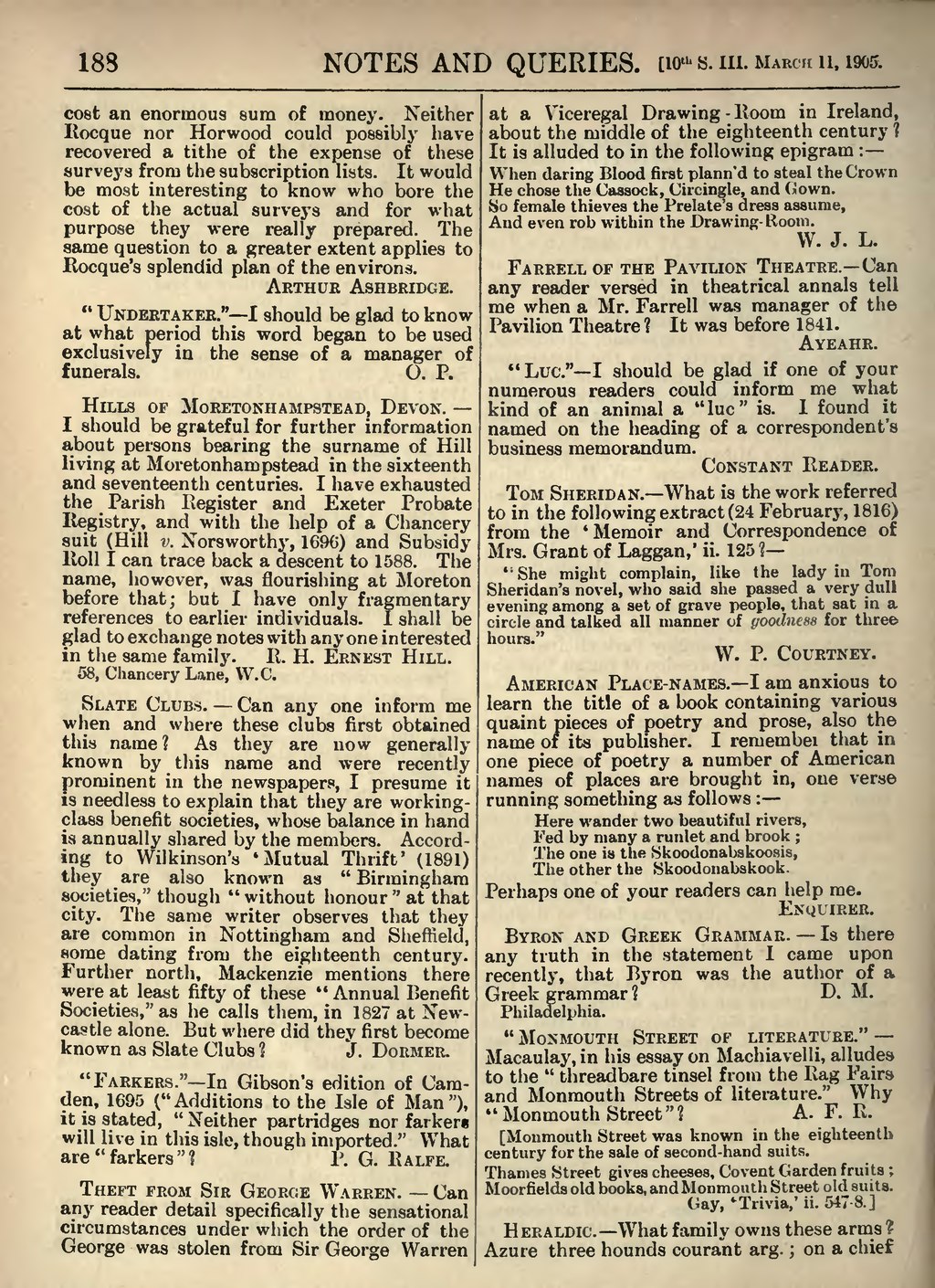183
NOTES AND QUERIES, cio* s. m. MARCR n, 1905.
cost an enormous sum of money. Neither
Rocque nor Horwood could possibly have
recovered a tithe of the expense of these
surveys from the subscription lists. It would
be most interesting to know who bore the
cost of the actual surveys and for what
purpose they were really prepared. The
same question to a greater extent applies to
Rocque's splendid plan of the environs.
ARTHUR ASHBRIDGE.
" UNDERTAKER." I should be glad to know at what period this word began to be used exclusively in the sense of a manager of funerals. O. P.
HlLLS OF MORETONHAMPSTEAD, DEVON.
I should be grateful for further information about persons bearing the surname of Hill living at Moretonhampstead in the sixteenth and seventeenth centuries. I have exhausted the Parish Register and Exeter Probate Registry, and with the help of a Chancery suit (Hill v. Norsworthy, 1696) and Subsidy lloll I can trace back a descent to 1588. The name, however, was flourishing at Moreton before that; but I have only fragmentary references to earlier individuals. I shall be glad to exchange notes with anyone interested in the same family. R. H. ERNEST HILL. 58, Chancery Lane, W. C.
SLATE CLUBS. Can any one inform me when and where these clubs first obtained this name ? As they are now generally known by this name and were recently prominent in the newspapers, I presume it is needless to explain that they are working- class benefit societies, whose balance in hand is annually shared by the members. Accord- ing to Wilkinson's 'Mutual Thrift' (1891) they are also known as " Birmingham societies," though " without honour " at that city. The same writer observes that they are common in Nottingham and Sheffield, some dating from the eighteenth century. Further north, Mackenzie mentions there were at least fifty of these "Annual P>enefit Societies," as he calls them, in 1827 at New- castle alone. But where did they first become known as Slate Clubs? J. DORMER.
"FARKERS." In Gibson's edition of Cam- den, 1695 ("Additions to the Isle of Man"), it is stated, "Neither partridges nor farkere will live in this isle, though imported." What are"farkers"? P. G. RALFE.
THEFT FROM SIR GEORGE WARREN. Can any reader detail specifically the sensational circumstances under which the order of the George was stolen from Sir George Warren
at a Viceregal Drawing -Room in Ireland,
about the middle of the eighteenth century ?
It is alluded to in the following epigram :
When daring Blood first plann'd to steal the Crown
He chose the Cassock, Circingle, and Gown.
So female thieves the Prelate's dress assume,
And even rob within the Drawing- Room.
W. J. L.
FARRELL OF THE PAVILION THEATRE. Can any reader versed in theatrical annals tell me when a Mr. Farrell was manager of the Pavilion Theatre? It was before 1841.
AYEAHR.
"Luc." I should be glad if one of your numerous readers could inform me what kind of an animal a "luc" is. 1 found it named on the heading of a correspondent's business memorandum.
CONSTANT READER.
TOM SHERIDAN. What is the work referred to in the following extract (24 February, 1816) from the 'Memoir and Correspondence of Mrs. Grant of Laggan,' ii. 125?
She might complain, like the lady in Tom Sheridan's novel, who said she passed a very dull evening among a set of grave people, that sat in a. circle and talked all manner of goodness for three, hours."
W. P. COURTNEY.
AMERICAN PLACE-NAMES. I am anxious to learn the title of a book containing various quaint pieces of poetry and prose, also the name of its publisher. I remember that in one piece of poetry a number of American names of places are brought in, one verse running something as follows :
Here wander two beautiful rivers,
Fed by many a runlet and brook ;
The one is the Skoodonabskoosis,
The other the Skoodonabskook.
Perhaps one of your readers can help me.
ENQUIRER.
BYRON AND GREEK GRAMMAR. Is there any truth in the statement I came upon recently, that Byron was the author of a Greek grammar? D. M.
Philadelphia.
" MONMOUTII STREET OF LITERATURE." - Macaulay,in his essay on Machiavelli, alludes to the " threadbare tinsel from the Rag Fairs and Monmouth Streets of literature." Why "Monmouth Street"? A. F. R.
[Monmouth Street was known in the eighteenth century for the sale of second-hand suits. Thames Street gives cheeses, Covent Garden fruits : Moorfields old books, and Monmouth Street oldsuits. Gay, 'Trivia,' ii. 547-8.]
HERALDIC. What family owns these arms ? Azure three hounds courant arg. ; on a chief
